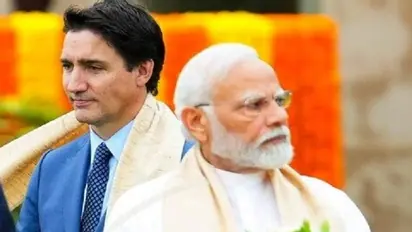'Exercise high degree of caution...' Canada issues new travel advisory for India amid Khalistan row

Synopsis
Canada sparked a major row by updating its travel advisory, wherein it advised its citizens to avoid travelling to several regions including Jammu and Kashmir, Assam and Manipur. "Exercise a high degree of caution while travelling to India. Exercise a high degree of caution in India due to the threat of terrorist attacks throughout the country," reads the message published on the Canadian website.
The Canadian government issued an advisory for its citizens living in India in view of the ongoing standoff between the two nations over the alleged killing of Khalistani terrorist Hardeep Singh Nijjar.
After Justin Trudeau claimed that "agents of the Indian government" were involved in the murder of the Khalistani terrorist, diplomatic ties between India and Canada soured. The advisory, which was posted on the government of Canada's website, urged Canadian citizens residing in India to exercise extreme caution. The warning advised travellers to "exercise a high degree of caution in India due to the threat of terrorist attacks across the nation."
It further said, "There are certain safety and security concerns or the situation could change quickly. Be very cautious at all times, monitor local media and follow the instructions of local authorities."
The advisory even asked it citizens to avoid all travel to Jammu and Kashmir due to the "unpredictable security situation".
India has categorically rejected Justin Trudeau's claim that there is a "potential link" between Indian government operatives and the murder of Nijjar, calling it "baseless" and "motivated," implying that it lacks factual support and may be influenced by hidden intentions or political reasons.
Canadian Foreign Minister Melanie Joly, earlier in the day, expelled a high-ranking Indian diplomat, identified as Pavan Kumar Rai, the head of the Research and Analysis Wing (RAW).
India responded by expelling Cameron MacKay, the Canadian High Commissioner to India, as a tit-for-tat measure. The Ministry of External Affairs (MEA) made it clear that the purpose of this move was to express New Delhi's growing worries over the "interference of Canadian diplomats in our internal matters and their involvement in anti-India activities."
Check the Breaking News Today and Latest News from across India and around the world. Stay updated with the latest World News and global developments from politics to economy and current affairs. Get in-depth coverage of China News, Europe News, Pakistan News, and South Asia News, along with top headlines from the UK and US. Follow expert analysis, international trends, and breaking updates from around the globe. Download the Asianet News Official App from the Android Play Store and iPhone App Store for accurate and timely news updates anytime, anywhere.